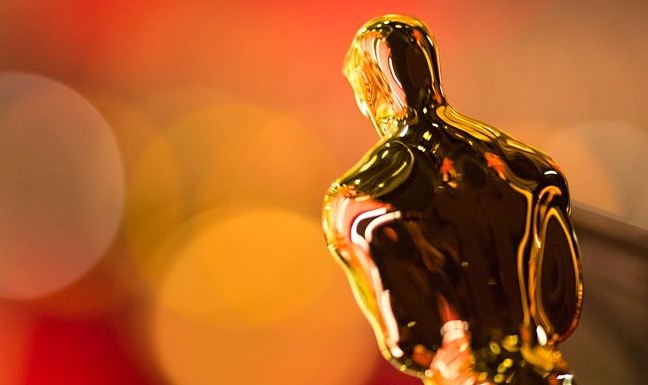
The Oscars are sort of like presidential elections — every once in a great while you get genuinely excited about the possibilities, which is usually followed by disappointment, at which point you realize disappointment is the historical norm. (I expected more? What was I thinking?) It’s been two years since Warren Beatty announced the wrong best picture and the producers of both La La Land and Moonlight took the stage, an all-time great Oscars moment I was lucky enough to witness in my own lifetime. Nothing especially memorable has happened since.
This year’s host-less show began with ex-American Idol star Adam Lambert (did you know that ABC, which air the Oscars, are bringing back American Idol!?) singing “We Will Rock You,” Queen’s cheesiest song, with the surviving members of Queen. Lambert vamped through fog, adding too much vibrato for a jock jam, while the camera cut to famous people in the crowd, dorkily stomping to the beat. Like most things on network television, it felt like cruise ship entertainment, mostly designed for the very young and the very old. It’s Vegas night on Carnival Cruise Lines! you almost expected Lambert to shout. Freddie Mercury’s eyes had to be rolling over in the grave.
The show had its moments, of course, as it always does. Regina King’s acceptance speech for best supporting actress was heartfelt and moving (If Beale Street Could Talk’s lone win); Olivia Colman accepting Best Actress was genuine and adorable. Maya Rudolph, Amy Poehler, and Tina Fey had a funny presenting turn (I’ll say it again: they should’ve hosted), as did Melissa McCarthy and Brian Tyree Henry in wacky outfits (if you can’t do wacky outfit humor on Oscars night when can you?). Samuel L. Jackson, who famously lacks a poker face on Oscars night, seemed to make a face when he had to present a best original screenplay Oscar to Green Book.
Still, the most memorable aspects of this year’s show were the lack of a host and the fact that it was almost certainly going to end with lots of people pissed off. That’s what happens when you nominate a bad biopic directed by a serial sexual abuser who got fired halfway through (Bohemian Rhapsody, which took home four awards) and a pat race parable from the director of Shallow Hal (Green Book, which won best picture).
As Wesley Morris wrote today in the New York Times, Green Book belongs to a long tradition of movies that white people congratulate for celebrating black and white friendships that are inherently transactional, where black people and white people become friends because one of them has a job. The difference in Green Book is that it’s the white guy working for the black guy! That’s not enough for some to erase the memory of The Help, The Blindside, Driving Miss Daisy, et. al, nor should it be. But isn’t that what the Oscars have always done? Reward incremental, barely perceptible progress (societally and artistically), tiny steps forward in traditional shoes? There’s a reason Spike Lee and Green Book got best picture nominations this year while If Beale Street Could Talk and Sorry To Bother You didn’t. Hopefully, Boots Riley won’t have to wait 20 years for the Academy to offer a symbolic apology for this slight like Spike did. But don’t hold your breath.
Did we expect anything else? Is it even worth dreaming that our hopes for a better world will be reflected in an awards show that began as Louis B. Mayer’s union-busting scheme? Is it possible to type the words “Louis B. Mayer’s union-busting scheme” without feeling like the world’s most crotchety well-actually guy? The movie industry is infamously nepotistic and stratified, and mostly always has been. We remember the times it hasn’t been because they’re outliers.
The Oscars’ most salient feature is wondering whether it’s even worthwhile to expect them to be better. Even with its much-ballyhooed diversity push this year, the Academy is overwhelmingly old and white, which is plainly apparent in their choices. Wanting them to be better feels like yelling at your grandpa. Do you want to lecture him about Sorry To Bother You or do you just give up and let him have Green Book and a blanket? Even debating it is a little exhausting.
As Morris wrote in his essay, comparing stories of interracial friendship from a white perspective like Green Book to the same from a black perspective, “In the black version, for one thing, they’re not about money or a job but about the actual emotional, psychological work of being black among white people.” Green Book might not offer white people enough of a sense of that emotional labor, but watching the Oscars consistently fail to recognize greatness in its own time sort of does.
The Oscars aren’t good. At best they offer the perennial promise that they might be good someday, a tacit promise we can all momentarily buy into in a collective act of trying to kick the football, Charlie Brown-style. The Oscars binds us in eternal disappointment. It’s egalitarian in the sense that we don’t even all have to be disappointed about the same things. We are brought together in gripes.
Vince Mancini is on Twitter. You can check out his archive of reviews here.






